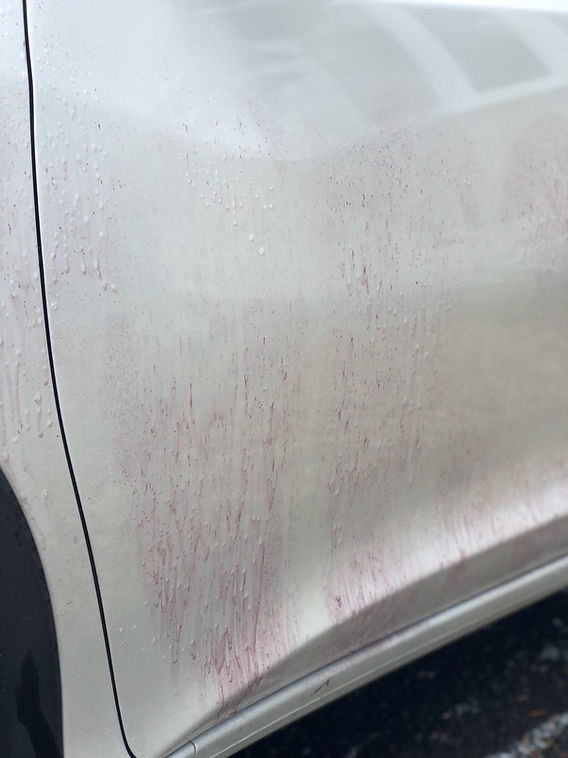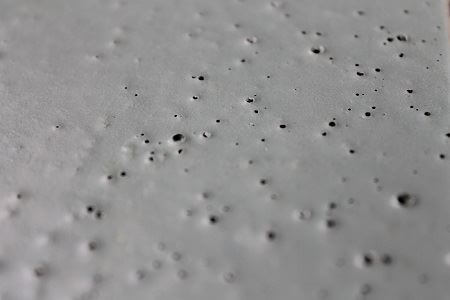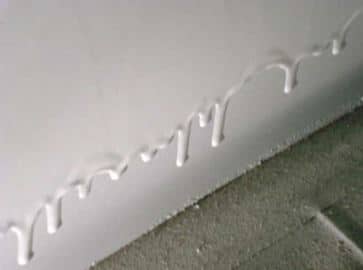Welcome back to phase 2 of our Paint issues article. This article will cover issues 21-30 in the list.
21 - Paint Grinning
22- Paint Suffering Heat Damage
23 - Impact Damage
24 - Inter-Coat Contamination
25 - Paint Mud Cracking
26 - Paint Orange Peel
27 - Paint Peeling
28 - Solvent Entrapment or Pinholes
29 - Rippled Coating
30 - Paint Runs
For the previous article on Paint issues 1-10 covering ( Abrasion, Adhesion Failure, Alligatoring, Bleeding, Blistering, Bloom, Bridging, Bubbling, Cathodic Disbonding and Challking)
Paint issues 1-10 view it here.
Paint issues 11-20 view it here
Painting Issues Can Ruin A Good Project
A fantastic paint job can make any project come to life...however after application there can be any number of paint issues which can ruin the same project. In this article we're going to run through the main reasons for paint failures, why they happen, how to spot them and how to prevent them in the future.
The daunting element of painting is that there are so many potential pitfalls for painting failures the list is almost endless! However at Ultrimax we've collated the top 42 paint problems that can occur on a paint job and we'll discuss here the type of paint coating failures and defects – why they happen and possible causes for them.
View our Complete Video Guide to 42 Paint Problems Below:
Paint Problem 21 - Paint Grinning
At 21 is Grinning not normally a failure in most of life but in coatings can be pretty disastrous!
Why It Happens
When you can see a previous paint layer such as a primer showing through the topcoat to the surface, its known as grinning. Its caused by having a low film thickness of topcoat, poor opacity, covering power of topcoat or possibly even too strong a colour of primer and undercoats.

Example of Paint Grinning
How To Prevent It
To prevent Grinning, apply adequate dry-film thickness between individual coats, and use opaque coatings with good opacity.
Paint Problem 22 - Heat Damage
22 is Heat damage and could be described as a by product of an accident rather than a defect in general.
Why It Happens
High temperature applied to a substrate will cause damage to almost any paint coating with the most likely causes being burning, welding, or fire.
Example of Heat Damage to A Car Spoiler
How To Prevent It
Ensure that all welding and burning work is completed prior to painting, in order to prevent Heat Damage.
Paint Problem 23 - Impact Damage
The next defect of paint coating is no 23 Impact Damage.
Why It Happens
This is damage caused by an object coming into contact with a paint surface . Most Likely to occur with relatively brittle coatings such as on glass-fibre-reinforced plastics. It also can occur when steel or any other substrate is deformed by impact.
Example of Impact Damage on Paint
How To Prevent It
Ensuring your paint coating remains protected is the only defence against impact damage
Paint Problem 24 - Inter-Coat Contamination
At 24 – Inter-coat Contamination is a tricky issue to identify.
Why It Happens
Examples of this issue could be contamination from inadequate washing down of the substrate. Alternatively salt deposits from natural weathering will appear on the surface and if not cleaned before painting can cause paint faults, even foreign deposits like soot from nearby operations can add contamination to a new coating.
Example of Rail Dust Paint Contamination
How To Prevent It
To prevent this, carefully inspect and test the surface before paint application, and wash down with fresh water if required.
Paint Problem 25 - Mud Cracking
Defect 25 is Mud Cracking.
Why It Happens
This is generally an overapplication of heavily pigmented primers such as inorganic zinc silicates or water-based coatings, although the issue can occur with other thick material systems.
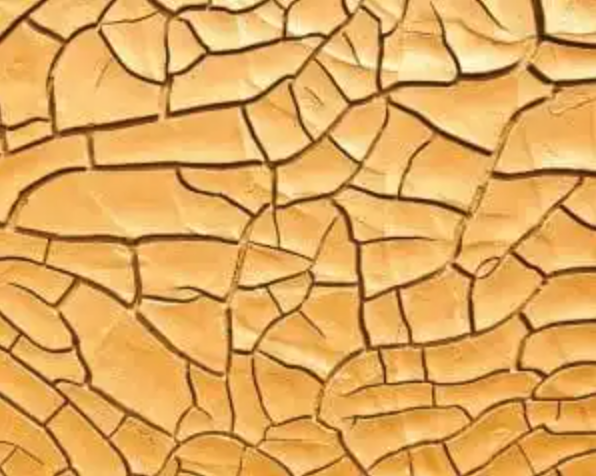
Example of Mud Cracking
How To Prevent It
A prevention of this is to rigidly stick to recommended coating thickness from technical datasheets and use only recommended application techniques, for example if a product is spray only don’t use a roller to apply.
Paint Problem 26 - The World Famous Orange Peel
Next up is Orange Peel no 26. Most people will have heard about this one professional or not!
Why It Happens
A common problem for automotive sprayers requiring premium finishes,
Orange peel is often caused by the failure of the paint film to flow out, and results in the distinctive orange peel surface. Poor application technique is the most frequent reason for flow issues but an incorrect solvent blend, or too high thixotropy where the material temporarily becomes a fluid then sets to a solid can also cause orange peel.
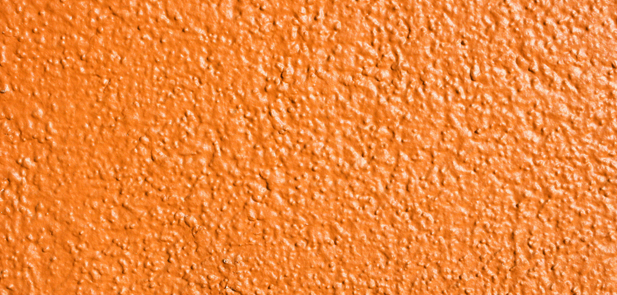
An example of Orange Peel against smooth paint on the same surface
How To Prevent It
To prevent this use correct application techniques with suitably formulated products especially when using 2k paints.
Paint Problem 27 - Paint Peeling
At 27 we have peeling a very common paint issue.
Why It Happens
Peeling is the reduction in bond strength of the paint film due to contamination or incompatibility of coats.
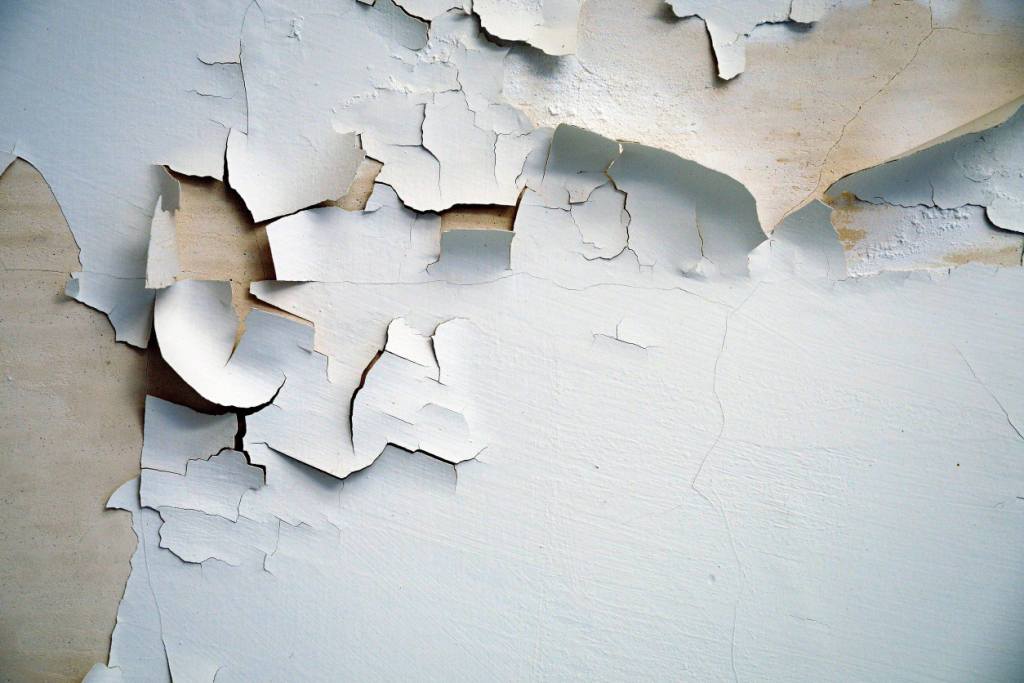
An example of paint peeling
How To Prevent It
A prevention of this is to use the correct coating system and specification shown on technical documents and only apply coatings to clean and uncontaminated surfaces.
Paint Problem 28 - Pinholes
Pinholes is defect no 28 and a very unusual issue to view if you are a spraying beginner!
Why It Happens
Solvent vapour or air gets entrapped within a paint film and as these vapours rise through the paint layer they create a mini volcano effect through the paint coating. It’s not only a visual problem, if painting where a water proof membrane is required pin holes will leach moisture down to the substrate destroying its waterproofing.
Example of Pinholes in Paint
How To Prevent It
To prevent getting Pinholes in your paint coating, use correct application techniques with suitably formulated products.
Check your datasheets for the correct solvent blends and paint in non humid environmental conditions. It’s also worth checking you are spraying from the correct distance of spray gun to surface and apply a mist coat.
Paint Problem 29 - Rippled Coating
29 is a Rippled Coating.
Why It Happens
A fairly easy defect to understand… this can be caused by strong wind blowing across the surface of wet paint causing it to ripple. Where this occurs on the underside, the ripples can hang down in the form of small stalactites, it’s also an issue that can be caused by poor application techniques.

Example of Rippled Paint Coatings
How To Prevent It
Prevent rippling by applying paint under calm, dry weather conditions and use professional application equipment.
Paint Problem 30 - The Runs
30 is the Runs!
Why It Happens
This is when there is overapplication of paint, excessive use of thinners, incorrect or lack of curing agent, or poor workmanship.
Example of Paint Runs
How To Prevent It
More often that not the runs are caused by applying too much paint to the substrate (otherwise known as human error) so prevent it by using the correct application techniques and always checking your dry film and wet film thicknesses.
Get The Next Instalment Of Paint Issues - Explained
For our next section of Paint Problems numbers 31-42 Check out the link here.
Need More Help With Paint Issues On Your Project?
If you can’t find a fix for the issue you’re experiencing or you need more advice Contact Us
YouTube: Need advice but like watching short videos? Check out our YouTube Help Channel.

